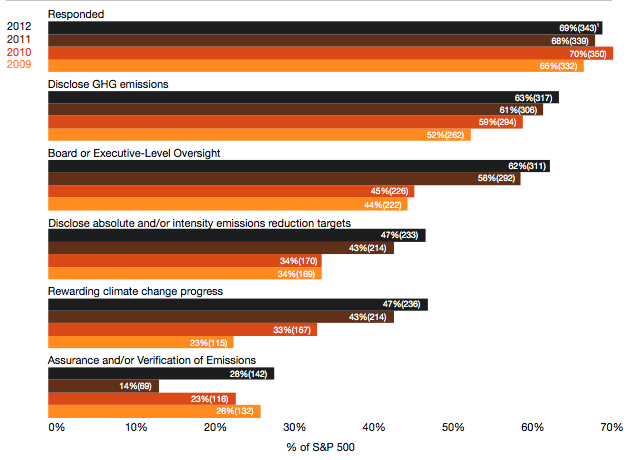A recent report by the Carbon Disclosure Project (CDP) concludes that S&P 500 corporations are increasingly factoring carbon reductions into their business models in an effort to reduce their ecological footprint. The “CDP S&P 500 Climate Change Report” analyzes the results of an annual survey taken by S&P 500 corporations (279 responded for the report). The survey asks companies detailed questions about their greenhouse gas emissions and climate change mitigation activities. This year’s results demonstrate that “in the absence of global or national regulation, business is stepping into the leadership vacuum and embracing climate change as a business imperative.”
CDP’s 2012 report found that companies surveyed are reaching emissions reduction targets and incorporating climate change into their business models. Of the participant companies, the percentage of those who reported absolute or intensity emissions reductions increased from 35% in 2011 to 52% this year. Additionally, the percentage of companies that met or exceeded their emissions reductions targets increased from 42% to 47% in the last year. This year also marked an increase in companies incorporating climate change into their risk management and business strategy, and disclosing greenhouse gas information in their Annual Report. Top performers in terms of information disclosure and climate performance include Allstate, Bank of America, and Lockheed Martin.
Companies that incorporate emissions reductions and efficiency activities into their business not only benefit financially by reducing their energy consumption, but also increase investor interest. “A growing number of investors view a company’s sustainability and climate change performance as a proxy for the overall quality of its risk and opportunity management systems.” This investor interest is driving both efforts to mitigate emissions as well as increased information disclosure.
More and more, companies are realizing the environmental and economic benefits of proactively addressing carbon emissions. Nearly three-quarters of S&P 500 companies surveyed believe climate change management and energy efficiency activities provide them with more business and financial opportunities. Indirectly, CDP’s report also points out that many large companies are declining to answer the annual survey: the lack of response from 221 companies may indicate a lack of interest in greenhouse gas emissions reporting, or a more active attempt to avoid disclosure of unfavorable data. The CDP report makes clear that in the absence of sound national energy policy, voluntary efforts by companies may vary in effectiveness, and some companies may not undertake any emissions reductions efforts until mandated to do so.
Featured image courtesy of naparex.com. “Year-Over-Year Disclosure For S&P 500 Respondents” graph courtesy of CDP S&P 500 Climate Change Report 2012.

